R. D’Meure – Introduction
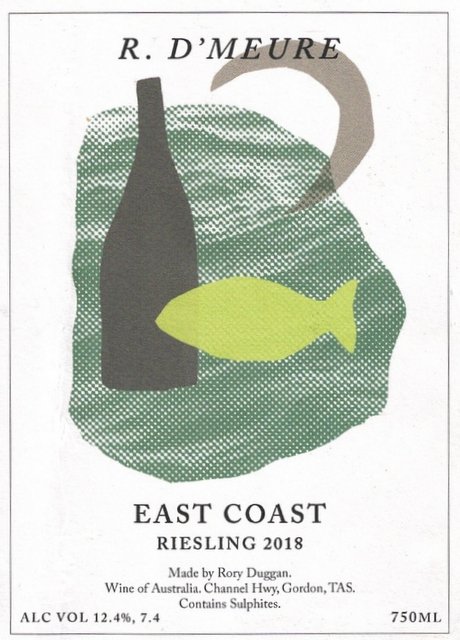
This is a story about one of Tasmania’s finest winemakers, Rory Duggan from R. D’Meure. But first we need to open the story by talking about some other serious players who have contributed to the success that Rory has achieved.
The first person to acknowledge is our very good friend Dirk Meure who many will know from his widely admired d’Meure wines. Dirk spent most of his career as an academic lawyer working in Sydney and in the United Kingdom. It was the time spent in the United Kingdom that was particularly important for this story as that was where he was introduced to the wines of Burgundy.
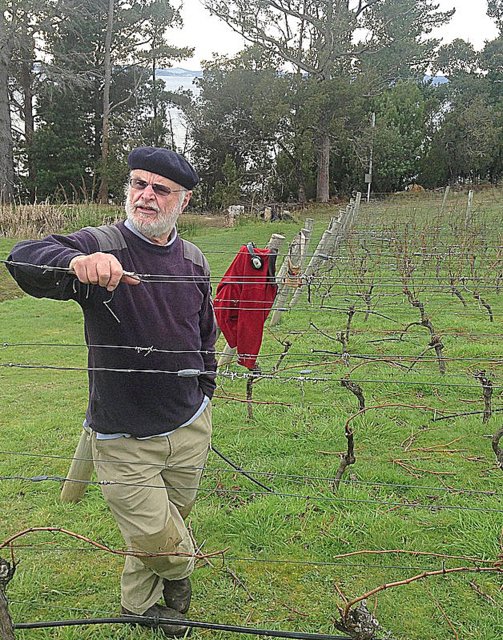
When he eventually retired from academia, he returned to Tasmania and bought a plot of land at Birchs Bay/Flowerpot and planted a vineyard to mainly Pinot Noir and Chardonnay, with some Sauvignon Blanc, Cabernet Franc, Pinot Gris, Malbec and Merlot. He established a winery on the edge of the vineyard and marketed the subsequent wines he made under the d’Meure name.
In 2004 Dirk made the decision to transition the vineyard to organic practices and this is where the story get interesting. A few years later a restaurant opened just over the road from Dirk’s vineyard.
This was the first restaurant run by recent imports from Sydney, namely Luke Burgess and Katrina Birchmeier.
It was through this restaurant that Dirk, Luke and Katrina became friends, Roger reconnected with Dirk from school and university days and we recognised the amazing talent of Luke in the kitchen and the organisational skills of Katrina as front of house.
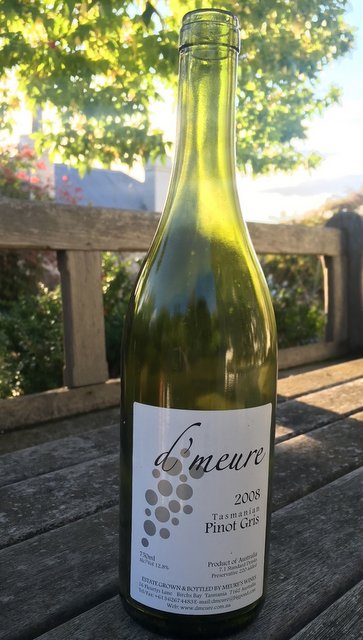
At this stage we had also started importing natural wines from France and selling them throughout Australia.
Luke took a great interest in Dirk’s wines and encouraged him to continue on his chosen road of biodynamics and fermentation of the grapes using natural yeasts rather than the commercial yeasts that were used by nearly every other winemaker in the state.
The resulting d’Meure wines were pure. They were full of flavour. They were exciting.
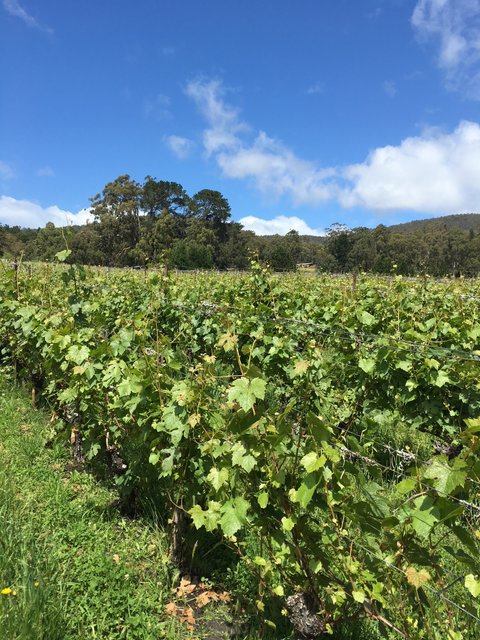
The next part of the story sees Luke and Katrina along with local industry professional, Kirk Richardson, opening Garagistes in 2010 in the Hobart CBD. When they opened, the wine selection was all natural (and the first restaurant in Australia to take this step) with a dazzling array of wines primarily from France, some from mainland Australia and Dirk’s wines from Tasmania.
When we turned up on the opening night every table had a bottle of Ganevat pet-nat opened and everyone seemed to be thoroughly enjoying sampling different wines to those normally served at a Hobart restaurant.
There was also Tasmanian wine on the wine list, namely the D’Meure wines.
We should add here that this approach has become quite winespread throughout the world in recent years as more and more chefs are realising that the flavour and texture of organic and biodynamic foods far outstrip their sprayed equivalent, it seems obvious that they would want to avoid serving wines made from grapes that had been sprayed.
Before long, Garagistes was known throughout the world, both for the innovative food and for the amazing wine list. Dirk’s wines were also in great demand throughout the country.
A few years later, Dirk’s nephew, Rory, moved to Tasmania and was exposed to the wine culture which Dirk and Luke had established. Rory became interested in natural wines and also what needs to be done to the soil and in the vineyard to ensure that the soil is healthy and that the vines have been managed correctly to provide the best chance of strong, healthy grapes being produced – a prerequisite for natural winemaking.
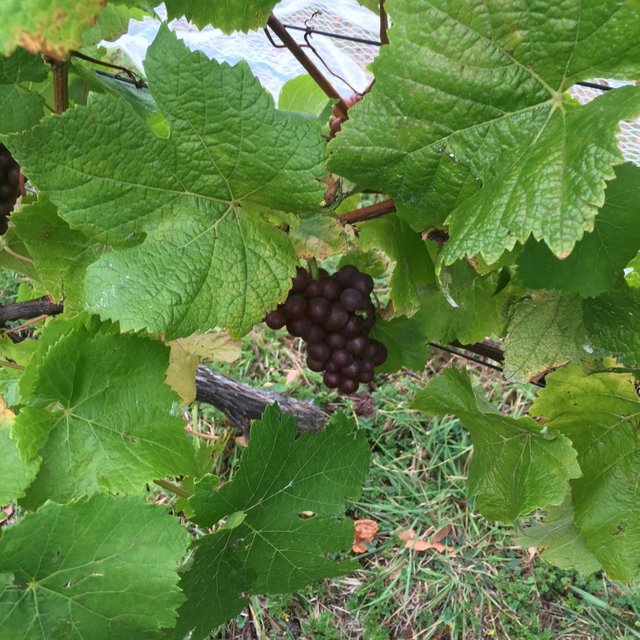
Eventually, Dirk retired and sold his vineyard and Rory continued his involvement with wine through a job with biodynamic winemaker Stefano Lubiana. The journey from here is described nicely on Rory’s Web site.
Several years passed as Dirk enjoyed the fruits of his time in the vines whilst Rory forged his own path, learning the ins and outs of canopy management, pruning and harvesting dreaming of the moment to strike out and cultivate his own site. That chance arrived when Antipodes was in need of a caretaker, Rory was ready to embark on his journey into wine. Following similar principles to Dirk and merging them with his own views Rory’s wines radiated complexity and character from his first vintage.
Now Rory was managing the Antipodes vineyard and producing wines that were turning heads.
The next part of the story sees Dirk returning to Tasmania and learning that his vineyard was on the market. He bought the site that he had previously sold and Rory now had two vineyards to manage. This part of the journey is also described on the R. D’Meure Web site:
Both Dirk and Rory came to appreciate each others wines over long lunches, industry gatherings and to all it was inevitable that they would one day come together to collaborate. Earlier this year Dirk was offered the opportunity to buy back the vineyard at Fleurty’s Lane and hence we have a most exciting partnership. With experience, tradition, youth and a sense of freedom to honour this craft and the way of wine.
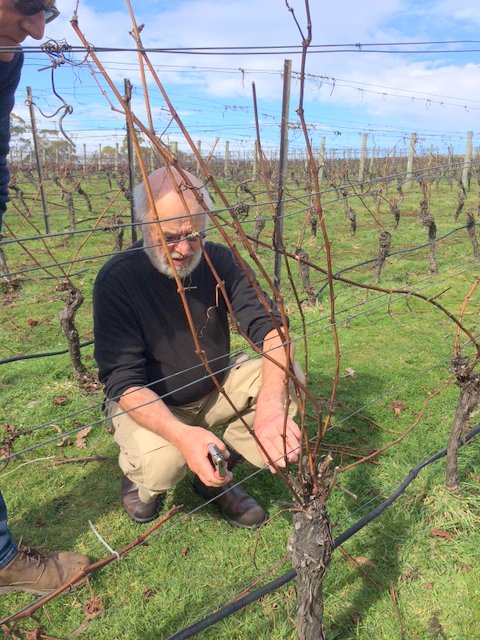
Rory is now well established with the vineyards at Cambridge (Antipodes) and the beautiful D’Meure vineyard at Birchs Bay looking out over Bruny Island. He has maintained many of the vineyard practices that Dirk implemented, with care of the soil being a major factor. He avoids compaction of the soil and maintains the cover grasses, which in turn, attracts beneficial insects and other creatures such as worms and spiders. His R. D’Meure wines from either vineyard are worth seeking out.
We have written before about the problem which occured in vineyards throughout Tasmania during the 2010 vintage when wasps invaded vineyards throughouyt the state. That year we were in Tasmania during the harvest and helped Dirk pick his grapes. There were spider webs everywhere in his vineyard and in many of them there were dead wasps – the spiders had captured them before they had an opportunity to damage the grapes!
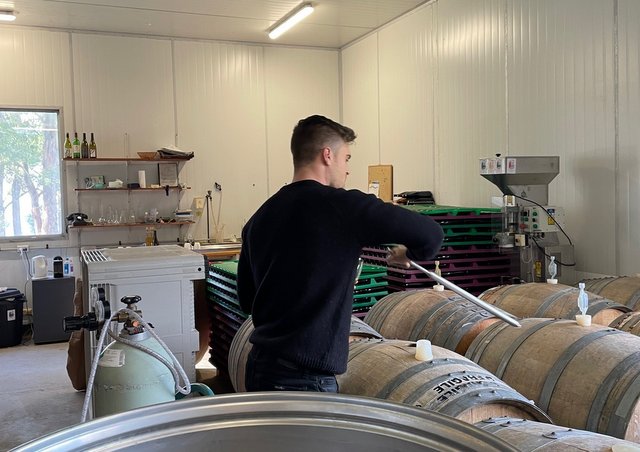
Rory is producing amazing wines and is demonstrating through his careful winemaking techniques that natural wines don’t have to be funky and “out-there”.
His R. D’Meure wines exhibit a purity and energy that is a reflection of the care he puts into managing the vineyards. The combination of his work in the vineyards and his thoughtful methods in the winery produces wines that derserve the allocades he has been receiving throughout Australia.
Having seen what Dirk, and now Rory, can achieve without the use of soil-damaging sprays, we look forward to other producers in Tasmania adopted a similar approach to wine making and vineyard management.
We have also mentioned the R. D’Meure wines in our story about organic produce here.

































